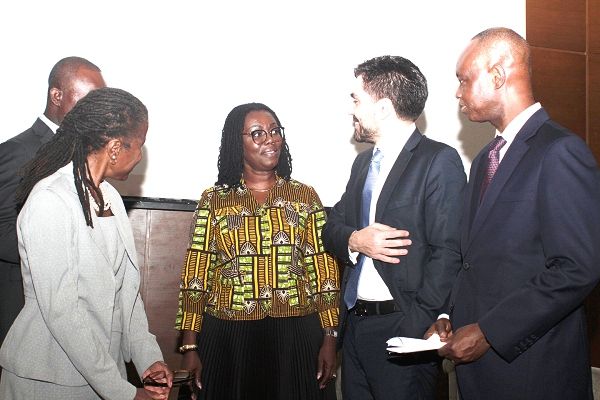
Communications Ministry commits to tackle cyber crime
The Ministry of Communications has declared its resolve to deal ruthlessly with cyber crime to ensure a safe digital space for national development.
In line with that, it is pursuing measures, such as leveraging international cooperation, to enhance and accelerate the fight against cyber crime with urgency.
Advertisement
The Minister of Communications, Mrs Ursula Owusu-Ekuful, said this in Accra yesterday when she opened a national conference and workshop on the technical implementation of the Budapest Convention, the only international treaty on cyber crime.
Workshop
The two-day workshop, jointly organised by the National Cyber Security Centre of Ghana, under the Ministry of Communications, and the Council of Europe, has brought together more than 100 participants drawn from the Judiciary and the private sector.
Others are policy makers and legislators.
The participants are to be educated on the Budapest Convention and its implementation gaps, benefits and opportunities.
Mrs Owusu-Ekuful said the growth in the use of digital services and products had made the cyber ecosystem an irresistible target for cyber criminals.
She pointed out that knowingly or unknowingly, people were exposed to cyber threats, as they affected every facet of the increasingly digitised lives of today.
She, therefore, stressed the need for cyber security to be strengthened as a matter of urgency “to ensure that we derive the full benefit of our emerging digital economy, while minimising the risks.”
Statistics
On Ghana, she said while statistics on the quantum of cyber crimes were difficult to come by, information available at the Ministry of Communications showed that about 400,000 scam messages were blocked from reaching their recipients on a daily basis, while half of mobile money subscribers had either experienced some form of fraud or been targets for mobile money fraudsters.
“The identities of some Members of Parliament and ministers of state have been cloned on Facebook and other social media platforms.
As quickly as these fake accounts are pulled down, others spring up,” she added.
She said the increased volumes of online transactions came with inevitable increased risks for users of the various online platforms, with telecommunication service providers reporting year-on-year increases in mobile money fraud cases.
Budapest Convention
Mrs Owusu-Ekuful said Ghana, as a demonstration of its commitment to fight cyber crime and the recognition that the fight would only be successful with international cooperation, acceded to the Budapest Convention in December 2018.
She said that made Ghana the 62nd state to have signed the treaty and the fifth country in Africa to have acceded to the convention, after Mauritius, Senegal, Cape Verde and Morocco.
Additionally, she said, Ghana had ratified the African Union Convention on Cyber Security and Personal Data Protection, also known as the Malabo Convention.
Domestic cooperation
On local cooperation, the minister pointed out that the lack of effective cooperation at the domestic level had impacted on efforts to fight cyber crime.
She said to enhance the fight, her ministry was currently working on draft cyber security legislation which would help further address some identified weaknesses in the country’s cyber crime laws and make provisions for appropriate sanctions for non-compliance with the cyber security provisions.
“In addition, the Council of Europe has assessed our current cyber crime legislation and identified some gaps which we need to fill in order to achieve compliance with the convention.
We will close all legal and regulatory gaps in our domestic legislation which will impede the full and effective implementation of the Malabo and the Budapest conventions and provide protection for our digital economy,” she said.
Council of Europe
On the global Internet space, the Programme Manager of Cybercrime at the Council of Europe, Mr Matteo Lucchetti, said 4.4 billion people, out of the 7.5 billion global population, were connected to the Internet.
Mr Lucchetti said the Internet permeated society in every single aspect of life and the number of users would continue to increase.
With respect to Ghana, he said the country was in the top 10 countries (ninth) in the world for the number of hours spent per day on social media.
“But while digitisation offers many development opportunities to achieve a better future, an equivalent rise must be registered of crimes committed against or through the use of computer systems; in brief, of cyber crimes,” he said.
NCA
The Director-General of the National Communications Authority, Mr Joe Anokye, proposed that one of the most important things the world needed now was a framework which would guide states on how to ensure the safety of citizens and increase their participation in the global economy without fear.
He said that was in view of increased globalisation, trade, connectivity and digital financial inclusion which gave citizens the ability to play across borders.
“It is in this interest that the NCA has, over the years, enthusiastically supported, in every way possible, Ghana’s accession to the Budapest Convention and its subsequent implementation,” he said.
Writer’s email [email protected]



